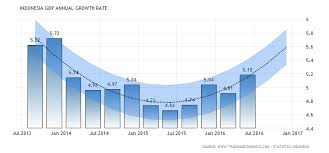The economic growth of Indonesia in Q2 2016 shows significant improvement compare to Q1 at the same year. The growth recorded faster than expected 5.18% in first quarter due to higher commodity prices and stronger consumption.
National Development Planning Minister Bambang Brodjonegoro said that Indonesia has to make extra effort to achieve high growth because of facing global trend, and domestic economic power hold important part of it.
Moreover, he said that the government will offer more tax incentives and ease off investment requirements in order to promote investment in labor-intensive industries. In addition, 1.1 million workers stand to benefit from vocational education to improve their skills provided by the Manpower Ministry. While for around 6 million households living under the poverty line will be provided subsidy and cash transfers defined as $25 per person per month, while keep trying to control the inflation to maintain purchasing power. As spoken by Bank Indonesia Governor Agus Martowardojo, that money returning home under tax amnesty can help expand the economy in the next year up to level 5.2 to 5.6 percent projected range.
The next year GDP growth target 5.3% may achieve will mostly depend on investment and household consumption of which in this year relatively resilient as people spent more money from the beginning of Muslim fasting month. While investment growing slower in the Q2 compared to first quarter, this might become critical concern for the government to keep up the investors interested invests in more sectors of business in Indonesia.
Thomas Lembong, chairman of the Investment Coordinating Board (BKPM), said that for investment Indonesia has to compete with other emerging markets, and making it imperative for the government to continue with reforms. The recent cabinet reshuffle, as Thomas said, gave the public strong signals that under the current administration economic reforms will continue or even speed up.
According to the investment board, foreign direct investment (FDI) into Indonesia in the second quarter reached Rp 99 trillion ($7.6 billion), up 7.9 percent compared to the corresponding period a year earlier. The BKPM targets attracting Rp. 595 trillion rupiahs of total Indonesian investment this year, up 9 percent from the realization of previous year Rp. 545.4 trillion, and are expected two-thirds of the investment come from FDI.
The next year target needs to be checked with the National Development Planning Agency (Bappenas) first, and should at least appropriate to current year’s target.

